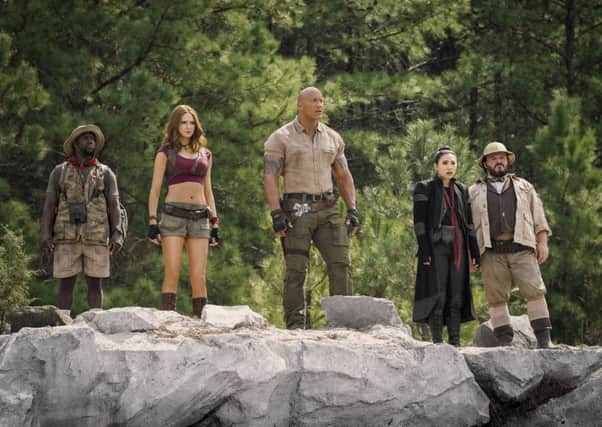Film reviews: Jumanji: The Next Level | Citizen K | QT8: The First Eight | Pink Wall


Jumanji: The Next Level (12A) ***
Citizen K (15) ****
QT8: The First Eight (15) ***
Pink Wall (15) ****
A lucrative reboot of the mid-1990s family film about a magical board-game that sucks its players into the action, 2017’s Jumanji: Welcome to the Jungle hit upon a neat way of updating the central premise by turning Jumanji into a vintage video game and casting the ever-likeable Dwayne Johnson, Karen Gillan and Jack Black as the game’s avatars (Kevin Hart, as the other avatar, remained fairly irritating). Sadly, the obvious body-switching trick of having them draw out their players’ inner strengths got pretty tiresome, pretty quickly, which made the prospect of a sequel the opposite of enticing. In a surprising twist, though, Jumanji: The Next Level turns out to be a lot more fun than its predecessor.
Sidelining some of the deadweight characters from the previous film, it may contrive a nonsensical reason for rebooting the potentially deadly game, but once it does so, it at least remembers to include some actual jokes. These mostly revolve around the fact that half of the in-game team this time are being played by senior citizens, who’ve never played a video game console in their lives.
Advertisement
Hide AdJohnson’s fearless Doctor Bravestone, for instance, is now the avatar for Danny DeVito’s Eddie, the decrepit (and bitter about it) grandfather of Spencer (Alex Wolff), one of the sulky teens who played the game last time and who, for reasons later explained away with what amounts to a shoulder-shrug, has opted to start it up again. Meanwhile, Hart’s diminutive zoologist, Franklin Finbar, is now the embodiment of Milo (Danny Glover), Eddie’s estranged business partner and former best friend. They’re in the house when Spencer’s friends show up to save Spencer from the game and they’re duly sucked into the action, joining returning wallflower Martha (Morgan Turner), once again transformed into the kick-ass form of Gillan’s martial arts expert Ruby Roundhouse, along with star athlete Anthony (Ser’Darius Blain), who’s not at all happy about this time being cast in the role of cartographer Professor Oberon (Black).
This new intergenerational dimension actually makes the body-swapping gag funnier and more interesting, with Johnson clearly having a blast playing a version of DeVito’s long line of twinkly curmudgeons and Hart finding some heart as Milo, whose long-winded digressions makes him thoroughly unsuited for the chaotic world of the game.
It’s Gillan, though, who is the real star of the show; her pseudo Lara Croft is wittier and more capable than the Lara Croft in the movies and she’s complimented by a scene-stealing turn from Awkwafina as the unexpected avatar of another key character.
It’s a bit of a shame the film pushes its luck with a groaning sequel set-up, but anyone looking for a diverting family adventure film for Christmas could do a lot worse than this – at least until a certain space saga descends upon multiplexes the world over.
Russia’s resurgence as a disruptive force on the global political stage gets a timely exploration in Alex Gibney’s latest documentary, Citizen K, which uses exiled Russian oligarch Mikhail Khodorkovsky as a prism through which to explore the post-Glasnost rise of gangster capitalism that in turn left the way free for Vladimir Putin to seize control of the country. Now living in London, Khodorkovsky spent ten years in the early 2000s in prison on trumped up charges after criticising Putin, and he remains the Russian president’s most powerful enemy. But Khodorokovsky is no angel himself: as the film illustrates, he got rich under Yeltsin by opening the country’s first commercial bank then capitalising on the country’s near bankrupt status to seize control of its oil industry by bailing out the government in time for Yeltsin’s re-election. But what’s fascinating is the transformation he’s undergone – with the acquisition of extreme wealth he also developed a conscience and instead of retrenching into a gated world of privilege far away from politics, like many of his compatriots, he’s since devoted himself to transforming the country and atoning for some of the chaos his rampant profiteering has wrought.
The title of QT8: The First Eight refers to the first eight movies of Quentin Tarantino and this documentary works as a useful primer for the maverick director’s career, covering his self-mythologising start as a video-store-clerk-turned-DIY-filmmaker right up to the making of 2015’s The Hateful Eight. If that seems an odd place to stop given this year’s release of Once Upon a Time in … Hollywood, it still does a good job of exploring his films and cinematic preoccupations via interviews with many of his most prominent collaborators, if not, sadly, the man himself. Although largely hagiographic in tone, it does delve into his working relationship with disgraced mogul Harvey Weinstein and functions as something of a mea culpa for the injuries Uma Thurman suffered while making Kill Bill.
Advertisement
Hide AdWritten and directed by Welsh actor Tom Cullen (Weekend), relationship drama Pink Wall makes good use of its micro-budget to experiment with form, presenting an elliptical yet incisive portrait of the complexities of long-term coupledom by zeroing in on six out-of-synch moments in the lives of its characters, Jenna and Leon. Played by Tatiana Maslany and mumblecore pioneer Jay Duplass, they’re entirely believable as a couple reckoning with their own fluctuating needs as desire waxes and wanes and time, career ambitions and the lure of children alter the shape of their relationship in almost imperceptible ways. The end result is raw, relatable indie filmmaking at its best.